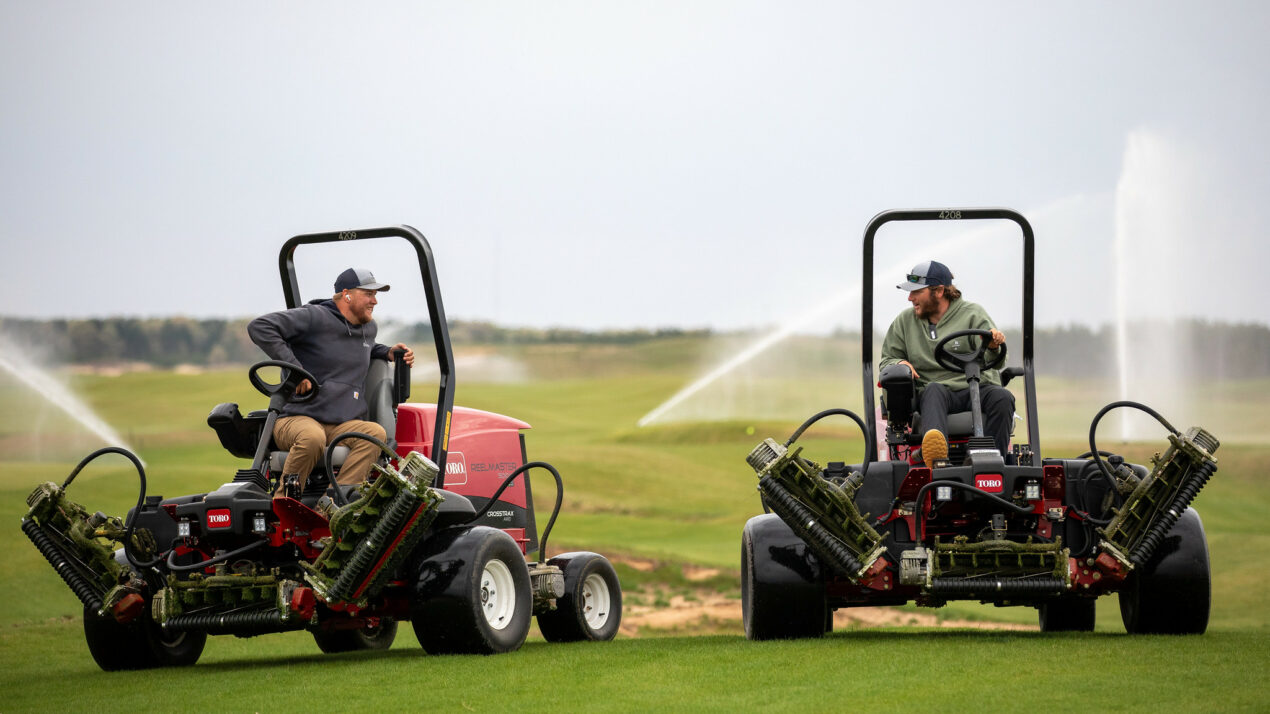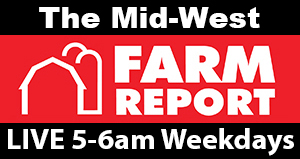
Pictured: In between mowing fairways, Dillon Nelson, left, and Trey Ryan, both students in UW-Madison’s Turfgrass Apprenticeship Program, discuss their plans to deal with an incoming weather storm at The Lido, one of Sand Valley’s golf courses near Nekoosa. Photo by Michael P. King/UW-Madison CALS
The Farm and Industry Short Course Turfgrass Apprenticeship Program provides “supercharged” training for management roles at golf courses and more.
Dillon Nelson has worked on the grounds of The Lido at Sand Valley Resort in Nekoosa since 2021. At that time, construction was still ongoing at the course. In the fall of 2022, Nelson entered the UW-Madison Turfgrass Apprenticeship Program to both expand and fine-tune his turfgrass expertise.
“Everything we were taught was useful, and we dove into everything — maintenance practices, disease and weed management, budgeting, irrigation, equipment training,” says Nelson. “We learned so much in so little time, and it’s so beneficial for me and the golf course.”
The two-part TAP curriculum consists of a 12-week bootcamp and a field-based apprenticeship. Prof. Paul Koch, extension specialist in the plant pathology department, and Prof. Doug Soldat, extension specialist in soil science, started the program. They wanted to provide training for newcomers to the field or those already working in turfgrass management.
“The material we provide for students is specialized for turfgrass. We offer the classroom section in the winter so students can continue to work in the spring and summer,” says Koch. “TAP costs less and takes less time than a liberal arts degree. It’s a supercharged amount of training in a short period to help students advance their turfgrass management careers.”
The turfgrass industry is an important contributor to the Wisconsin economy. Golf alone has an annual economic impact of $2.4 billion. Koch and Soldat have seen a lot of interest in TAP from employers and turfgrass associations. Nelson was the recipient of a scholarship from the Wisconsin Sports Turf Managers Association. A total of $13,000 in scholarships were available to students this past year.
The Program Grows
TAP grew from five students to 19 in its first two years. Koch and Soldat say they’re impressed by the students’ dedication and excitement. During the bootcamp, students attend “shop talks,” learning directly from superintendents and equipment maintenance experts. They then go on to complete their internship in the spring. Students can earn two certificates in the program – one for the bootcamp and the other for the internship.
To develop internship requirements, Koch and Soldat worked with golf courses, sod growers and landscapers to create a list of skills. These skills demonstrate competency in the turfgrass field. They worked off that list to set expectations for the internships.
“We now have lists of tasks for each type of internship. For a golf course internship, you might have tasks in many areas such as financial management, record keeping and guest relations,” says Soldat. “Students have to complete a certain percentage of tasks to get their second certificate.”
Students who complete the program take their expertise to positions at golf courses, lawn care companies or in other areas of turfgrass management. Nelson now has a full-time position at The Lido, which opened to play in May of this year.
For more information about TAP and to register for the 2023-2024 program, visit https://go.wisc.edu/tap. Deadline for enrollment in the fall term is Oct. 15.

Leave a Reply